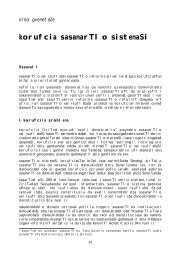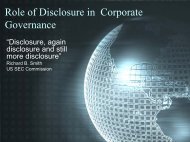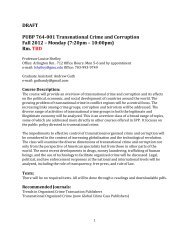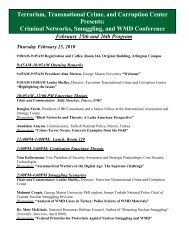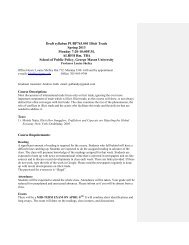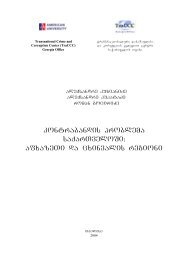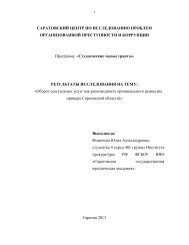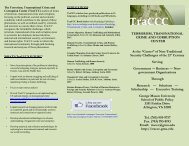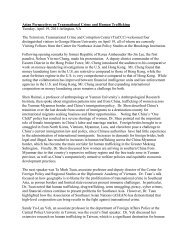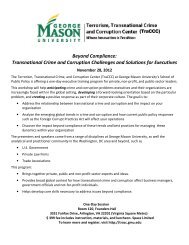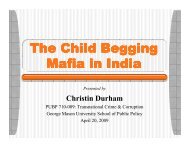syllabus - Terrorism, Transnational Crime and Corruption Center
syllabus - Terrorism, Transnational Crime and Corruption Center
syllabus - Terrorism, Transnational Crime and Corruption Center
Create successful ePaper yourself
Turn your PDF publications into a flip-book with our unique Google optimized e-Paper software.
January 26 Week 1- Introduction to the Course<br />
Why are transnational crime <strong>and</strong> corruption important public policy concerns <strong>and</strong> how do<br />
they relate to national security <strong>and</strong> peace keeping? How does transnational crime affect<br />
international commerce? Why does an underst<strong>and</strong>ing of these phenomena require a<br />
multi-disciplinary (history, political science, economics, sociology <strong>and</strong> security studies)<br />
perspective? How is transnational crime related to the prolongation of conflict? What are<br />
the linkages between transnational crime, corruption <strong>and</strong> terrorism?<br />
Required Readings:<br />
Thachuk: foreword<br />
Nordstrom: Preface , ch 1-2 (pp.3-17)<br />
Feb. 2 Week 2 - Conceptualizing the Problem<br />
The rise of transnational crime has been tied to globalization, the rise of non-state actors,<br />
the retreat of the state <strong>and</strong> the presence of weak states. This week we will examine<br />
transnational crime in terms of all these trends, but also show that it often has deep<br />
historical roots within many societies that are overlooked in many current analyses that<br />
focus on the recent rise of the phenomena. The implications of the rise of transnational<br />
crime for state sovereignty are central.<br />
Why do organized crime <strong>and</strong> corruption look so different to those in the transitional <strong>and</strong><br />
developing world from those in the developed world? Why has transnational organized<br />
crime increased with globalization <strong>and</strong> the new technological revolution? How is it<br />
related to national sovereignty <strong>and</strong> the strength of the state?<br />
Required Readings:<br />
Louise Shelley, "<strong>Transnational</strong> Organized <strong>Crime</strong>: An Imminent Threat to the Nation<br />
State?," Journal of International Affairs, Vol. 45, No. 2, p. 463-489, Winter 1995 (see e-<br />
reserves).<br />
Thachuk: introduction, pp.3-20.<br />
Susan Strange, "Organized <strong>Crime</strong>: the Mafias," Retreat of the State: The Diffusion of<br />
Power in the World Economy, p. 110-121, 1996 (see e-reserves)<br />
Berdal <strong>and</strong> Malone 91-111 (Collier essay)<br />
Nordstorm—ch 3 (pp.19-24)<br />
Feb. 9 Week 3 - The Globalization of <strong>Transnational</strong> <strong>Crime</strong> <strong>and</strong> <strong>Corruption</strong><br />
4



